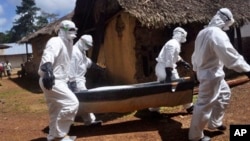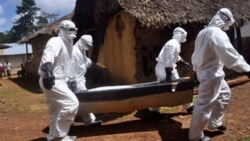Pressing our nation’s efforts to confront the outbreak of Ebola fever both in West Africa and elsewhere, President Barack Obama called his top advisers to the White House for a rare Saturday night meeting to discuss the situation. It was the third such session in four days with top administration officials devoted entirely to the crisis. The president also discussed Ebola in his weekly national radio broadcast, urging Americans to learn more about the disease and not be confused or panicked by rumors or misunderstanding.
The U.S. is actively engaged in fighting the Ebola outbreak. It has deployed more than 750 U.S. government personnel to West Africa, making this the largest-ever U.S. response to a global health crisis. These efforts are focused on controlling the spread of the disease through a number of activities, such as constructing and supporting Ebola treatment units; airlifting critical medical and relief supplies; supporting burial teams; and increasing the number of labs to double specimen testing capacity.
While these actions are critical, health experts acknowledge that breaking the cycle of transmission will also require outreach and active engagement with affected communities. The U.S. Agency for International Development is working with its global partners to build community care centers, which will provide communities with another level of care and isolation, as well as training on how to protect themselves and their families. USAID is also partnering with affected countries, UNICEF, the Paul G. Allen Family Foundation, and other organizations on the ground to provide thousands of community care kits, with the goal of preventing further infections within the community. More than 9,000 of the kits -- which contain protective gowns, gloves and masks, soap, and chlorine —- have been delivered to Liberia’s capital, Monrovia.
The United States is also supporting public education and outreach campaigns —- reaching some of the most remote areas with life-saving information on how to identify, treat, and prevent Ebola. These messages are being conveyed through radio, text, newspapers, as well as by word-of-mouth.
West Africa is facing the largest, most devastating Ebola outbreak in history. It will take a coordinated global effort to stop this epidemic and help affected countries recover.

















